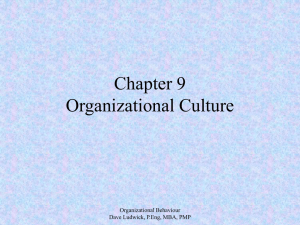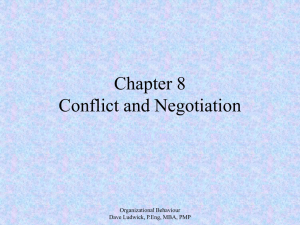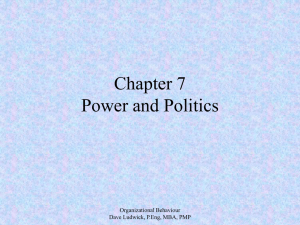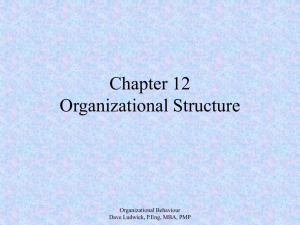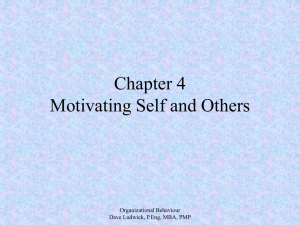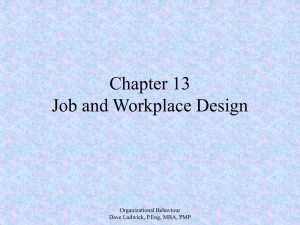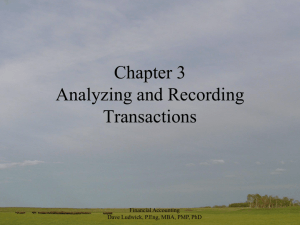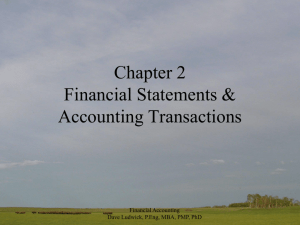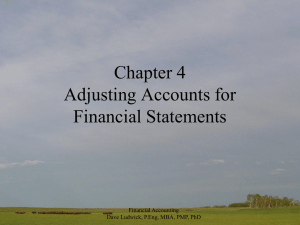Organizational Behaviour Chapter 5 - Groups
advertisement
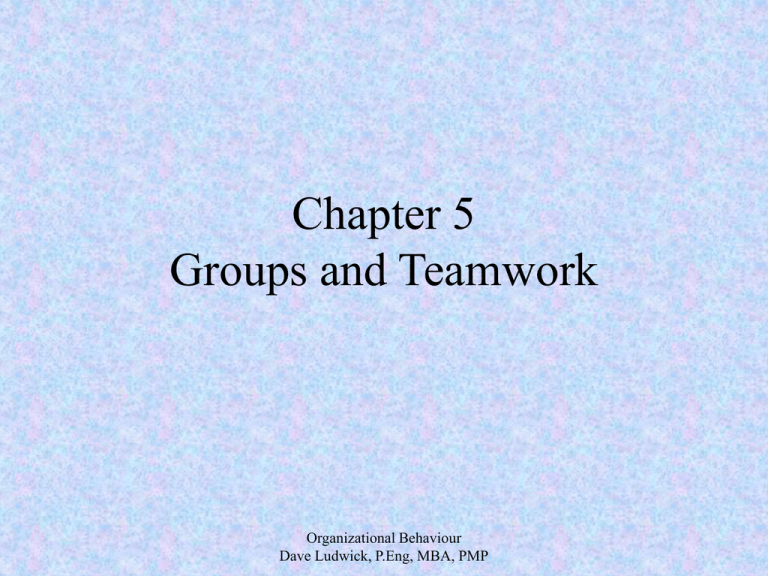
Chapter 5 Groups and Teamwork Organizational Behaviour Dave Ludwick, P.Eng, MBA, PMP Teams vs. Groups • Group – two or more individuals interacting and interdependent who have a stable relationship, common goal and perceive themselves to be a group • Team – a Group that works closely together toward a common objective and are accountable to one another • Why are teams popular these days? – They create a potential for an organization to generate outputs with no increase in inputs – Teams generally outperform individuals when the tasks require multiple skills, judgment and experience – Teams are more responsive to change, can quickly assemble, deploy, refocus and disband Organizational Behaviour Dave Ludwick, P.Eng, MBA, PMP 4 Types of Teams • Problem Solving Teams – These teams are built from people often from the same department, who get together to discuss improving quality, efficiency, environment – They are rarely given the authority to implement their recommendations – Sometimes called Quality Circles • Self Managed Teams – Made up of employees whose jobs are related or interdependent – They take on the responsibilities of their managers to make decisions – They collectively control the work pace making operating decisions – May be so authoritative that managers may not be required Organizational Behaviour Dave Ludwick, P.Eng, MBA, PMP 4 Types of Teams • Cross Functional Teams – These temporary are made up of employees from about the same hierarchical level but from different departments who come together to accomplish a complete task – Skunk Works are a type of cross functional team that develop spontaneously to create new products usually outside the rules of the organization • Virtual Teams – Use computer technology and ancient technology (a phone) to tie together physically dispersed members to achieve a goal – Usually more possible in knowledge based industries Organizational Behaviour Dave Ludwick, P.Eng, MBA, PMP Definitions around Roles • Roles – a set of expected behaviour patterns attributed to someone occupying a position • Role Identity – attitudes and behaviours identified with a role • Role Perception – a person’s view of how they are supposed to act in a given role • Role Expectations – how others believe a person should act in a given situation • Psychological Contract – an unwritten agreement stating what management expects of an employee and vice versa • Role Conflict – a situation where a person is confronted by divergent role expectations Organizational Behaviour Dave Ludwick, P.Eng, MBA, PMP Norms • Norms – acceptable standards of behaviour, shared by group members – Usually developed gradually as groups learn what team behaviours are necessary for efficiency – Norms get established if • • • • They facilitate the group’s survival Increase predictability of member’s behaviour Reduce interpersonal problems Allow members to express central values • Conformity is when people adopt group norms. There can be significant pressure to conform Organizational Behaviour Dave Ludwick, P.Eng, MBA, PMP Norms • Deviant Workplace Behaviour – Antisocial actions by members that intentionally violate established norms that result in negative consequences for the organization or its members • Status – Socailly defined rank – It is a significant motivator – High status group members can often deviate or avoid conforming to norms – Note that status importance varies widely across cultures Organizational Behaviour Dave Ludwick, P.Eng, MBA, PMP 5 Stages of Group Development • Forming – where members are testing the waters on accepted behaviour. The team is determining its purpose • Storming – intragroup conflict caused by imposing group constraints on individuality • Norming – a strong sense of team identity and camaraderie has developed and there is a common understanding of correct behaviour • Performing – when significant task progress is being made • Adjourning – wrapping up activities and disbanding Organizational Behaviour Dave Ludwick, P.Eng, MBA, PMP Creating Effective Teams • Effective teams take collective responsibility for their tasks • Effective teams have the ability to complete a whole and identifiable task • Typically an effective team has 3 types of skills – Technical skills – Problem solving/decision making skills – Interpersonal skills to listen, provide feedback and resolve conflicts • Effective teams still possess conflict. But this conflict remains over tasks, and not matters intrinsic to the group • Effective teams also have a good mix of personalities Organizational Behaviour Dave Ludwick, P.Eng, MBA, PMP Creating Effective Teams • Effective teams can be of varying sizes. – However, usually the tighter the team, the faster it can respond. – Also, when decision making is required, larger teams can often benefit from more members having a wider range of experiences • Effective teams are made up of members who are flexible, who are cross trained for each other’s tasks • Members provide feedback to each other, reminding each other of their responsibility • Effective teams have a common purpose that can be translated into specific measurable goals which are realistic • Effective tams believe they can succeed (team efficacy) Organizational Behaviour Dave Ludwick, P.Eng, MBA, PMP The Cost of Teams • Teams do come at a cost – Teams require more resources (by definition you need more than 1 person) – Teams require communication (any time you get more than one person involved in a task, communication must be present to coordinate activity) – Conflicts must be managed (if you have a conflict with a team of one, you have another problem!!) – Meetings must be run • Another Team?! Organizational Behaviour Dave Ludwick, P.Eng, MBA, PMP Exercise • Read Chapter 5 Point/Counterpoint (p. 208) • Questions – What is the role of the team coach? How are coaches successful? – In pro sport, why are coaches fired for poor team performance? – We’ve seen that effective teams have many characteristics. What are the top 3 components that make up a successful team? • Chapter 6 Organizational Behaviour Dave Ludwick, P.Eng, MBA, PMP
